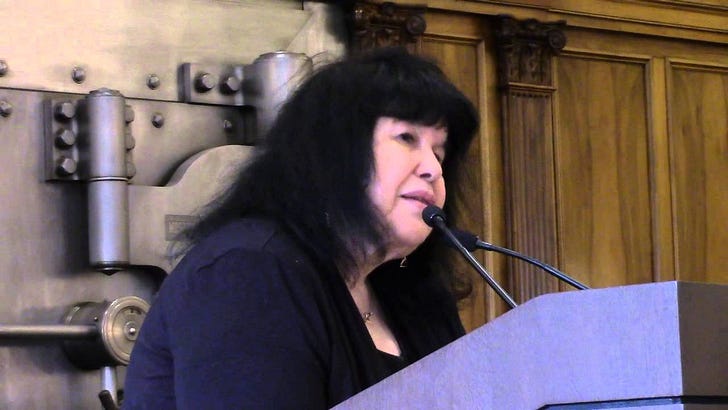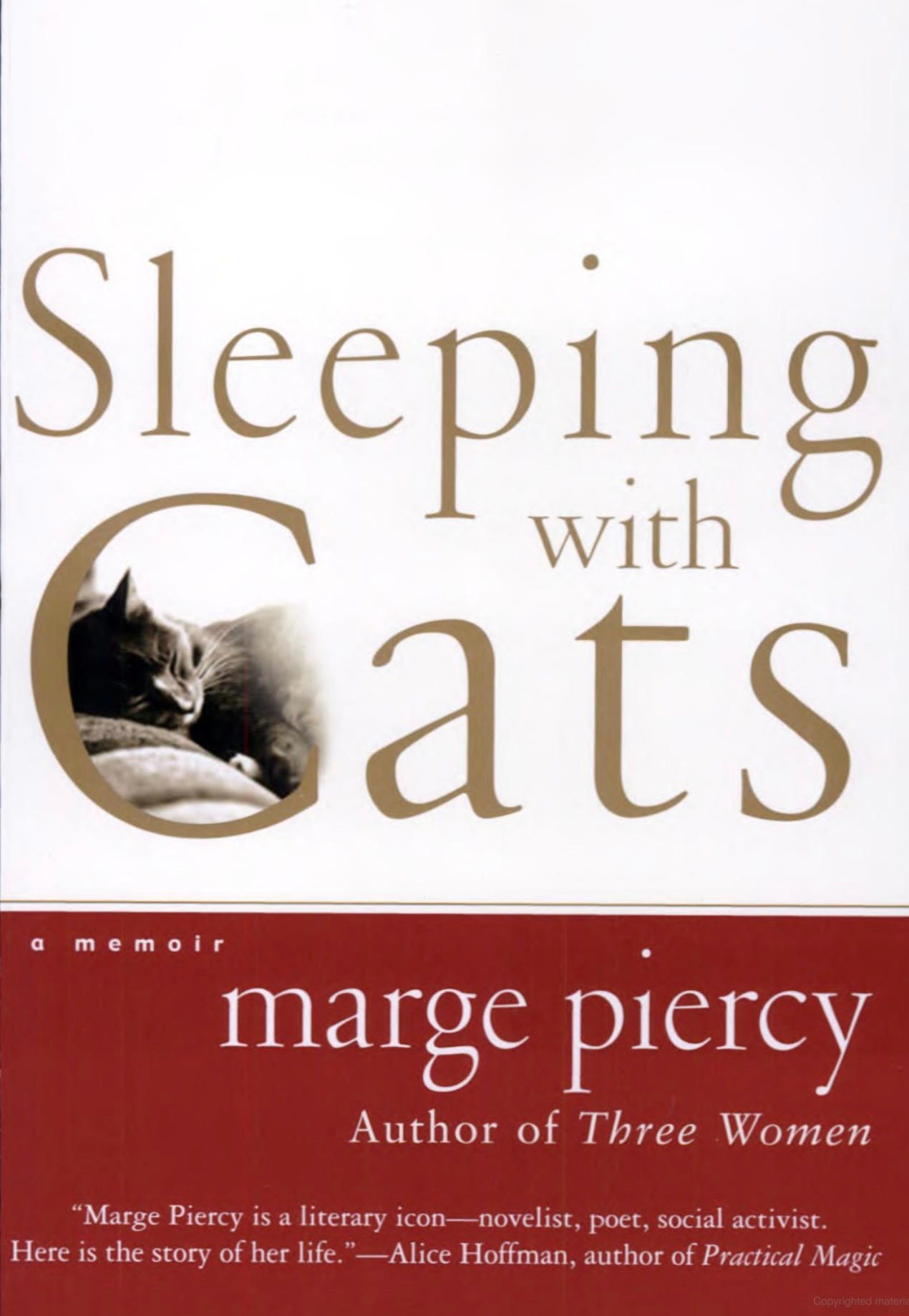Marge Piercy: “The people I love the best / jump into work head first / without dallying in the shallows”
Today's poet is Marge Piercy—poet, novelist, political activist and lover of cats
Marge Piercy is a prolific writer of novels and poems. She was born in Detroit in the 1930’s into a family that was struggling during The Great Depression. She was an active kid who had no interest in books until she fell ill. In a podcast interview, she describes what happened:
“I was a complete tomboy until I had German measles followed by rheumatic fever. After that I weighed about 25 pounds. I was pale blue and passed out all the time for about a year…. I started reading while I was ill. Up to that point, I’d had no interest in school. Suddenly, I shot to the top of my class.”
Piercy became the first in her family to go college, earning both a bachelor’s and a Master’s degree. She also became very politically active during college, and has remained so to this day. Some of her causes include feminism and the environment.
Piercy did not stay in academia and a glimpse into why can be found in this anecdote from the same podcast:
“Where I’ve lived since 1971 is a village out on Cape Cod, where your friends are not other academics. You might have an academic or two as your friend because people come out here. But your friends are shell fishermen, contractors, people who work in stores, people who do all kinds of things...”
This affinity for the working class, and the marginalized, runs through her life and work. In fact, one of Piercy’s most famous poems is “To Be of Use” and is about her reverence for people who work hard.
It begins, “The people I love the best / jump into work head first / without dallying in the shallows.”
And it continues with descriptions of labor—actual and metaphorical:
I love people who harness themselves, an ox to a heavy cart,
who pull like water buffalo, with massive patience,
who strain in the mud and the muck to move things forward,
who do what has to be done, again and again.
The poem describes the work of the world—muddy and “common,” full of effort and sweat, tangible work, repetitive work. She writes that she wants to join the “people who submerge / in the task, who go into the fields to harvest / and work in a row and pass the bags along.”
I love the choice of the word “submerge” here. And the images are so evocative.
The poem ends with a beautiful juxtaposition of object and human—each doing their work:
Hopi vases that held corn, are put in museums but you know they were made to be used. The pitcher cries for water to carry and a person for work that is real.
Read the full poem here.
In this fantastic article for The New York Times’ series “Writers on Writing,” Piercy compares her two main art forms: novels and poems. She is often asked about the two forms at readings and in interviews. Here are two tiny tidbits from the larger exploration of each form.
About poems:
Poems hatch from memory, fantasy, the need to communicate with the living, the dead, the unborn. Poems come directly out of daily life, from the garden, the cats, the newspaper, the lives of friends, quarrels...
About novels:
Prose is prosier. No high-flying language here. My urge to write fiction comes from the same part of my psyche that cannot resist eavesdropping on strangers’ conversations in airports, in restaurants, in the supermarket. I am a nosy person.
Read the full article here. It’s a great read!
If you would like a glimpse into Piercy’s daily life, she posts regularly on her blog. She is 89 now and her blog is like a journal; you can read about her garden, the challenges of aging, the seasons changing, her beloved cats, and more. Here are some glimpses.
About the garden: I’m hoping to transplant more seedlings into my garden this week. Chinese cabbage, especially. The perennial beds, and my pollinator garden, all need to be cleaned and fed. 1
About aging & doctor visits: Friday I had to fast until 2 pm because I needed to get blood work done…. I hate fasting. I get nauseous, dizzy and grumpy…. but I did write a poem. About food, of course. 2
About spring: I enjoy the long slow Cape spring. I grew up in Detroit where my father used to joke there were two seasons, winter and the 4th of July. When I lived in San Francisco, I missed seasons. Without a true winter, spring means little. 3
About the new Bob Dylan film: We watched the Dylan movie last night. I enjoyed it but you can see why he had so much trouble forming lasting relationships, at least at that age. Having lived through those times, I thought it was pretty faithful, but downplayed activism. 4
You can read her blog here. Also, you can find out more about her life, work, books, and other projects at her website.
More, please
Marge Piercy’s website
For more on Piercy’s life and work, with a sampling of poems, here (Poetry Foundation)
Another great site for her life and work, also with a sampling of poems (Poets.org)
A reading at the 2015 Mass Poetry Festival:
The podcast interview referenced in the post:
A few written interviews here and here.
The fantastic article Piercy wrote for The New York Times
Her memoir is called “Sleeping with Cats: A Memoir” and a major theme is how cats have been a “loving constant that offered her comfort and meaning” during all the changes in Piercy’s life. The cover is pictured below:
How about you? Have you heard of Marge Piercy before? Do you have a favorite poem?
See you tomorrow with another poet!
Jenny
From this blog post: https://margepiercy.com/blog/89-i-cant-believe-it-myself
From this blog post: https://margepiercy.com/blog/the-weel-that-would-have-been
From this blog post: https://margepiercy.com/blog/daddodils-make-me-enormously-happy
From this blog post: https://margepiercy.com/blog/89-i-cant-believe-it-myself






“Sleeping with Cats” sounds like a memoir I need to read. Also she offers some wonderful thoughts on creativity in that NYT article, like this, about how switching genre helps with writer’s block:
“Sometimes I say that if a writer works in more than one genre, the chances of getting writer's block are greatly diminished. If I am stuck in a difficult passage of a novel, I may jump ahead to smoother ground, or I may pause and work on poems exclusively for a time. If I lack ideas for one genre, usually I have them simmering for the other.“
Thanks for the intro, Jenny!